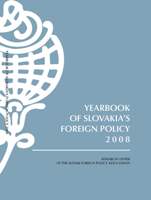Severoatlantická aliancia a Slovensko v roku 2008
The North Atlantic Treaty Organization and Slovakia in 2008
Author(s): Matúš Korba
Subject(s): Politics, International relations/trade, Security and defense, Military policy
Published by: Research Center of the Slovak Foreign Policy Association (RC SFPA)
Keywords: Slovakia; 2008; foreign policy; NATO; Bucharest; summit; military policy; Afganista; Balkans;
Summary/Abstract: September 2008 marked ten years from the parliamentary elections which transformed the internal political relations in the Slovak Republic and created the conditions for Slovakia’s integration into the North Atlantic Treaty Organization. This arduous and complicated process was launched in autumn 1998 and it bore fruit five years later in the shape of full-fledged membership in NATO. In March 2004, the Slovak Republic gained not only security guarantees, but also joined the politically most significant and militarily strongest alliance in the world today, while taking on its own share of the responsibilities for maintaining international security. The past decade represents a sufficiently long time-frame not only to assess the integration process, but also to evaluate the subsequent adaptation of Slovakia to NATO structures. Between 2004 and 2008, the Slovak Republic faced the challenge of actively participating in both the political activities of the North Atlantic Treaty Organization and in its military operations relating to crisis management. The analysis presented below describes how Slovakia coped with this challenge and outlines the tasks that it is currently fulfilling within a transitionary NATO. The first decade of the 21st century forced the Alliance to face the challenge of adapting to the rapidly changing security environment in Europe and the world. The dynamism of these changes was also reflected in the regular NATO Summits held every other year with a regularity unprecedented in the previous history of this organization, stretching back more than half a century. The past six years have shown that there is a broad plurality of opinions on the role of the Alliance in international security within NATO. On the one hand, this fact underlined the democratic character of the organization, but on the other it simultaneously decreased its action readiness, which was reliant on the consensus of all member states.
Book: Ročenka zahraničnej politiky Slovenskej republiky 2008
- Page Range: 37-47
- Page Count: 11
- Publication Year: 2009
- Language: Slovak
- Content File-PDF

